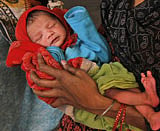
The United Nations said that by its best estimates the seven billionth baby would be born on October 31, and countries around the world have been marking the demographic milestone in a variety of ways.
Russian authorities showered gifts on newborns, while Papua New Guinea handed out special “goody bags” for new mothers.
The Philippines was the first country to declare a seven billionth baby, a little girl named Danica May Camacho. Weighing 2.5 kilos, Danica was delivered just before midnight on Sunday under a blitz of media camera flashes at Manila’s Jose Fabella Memorial Hospital.
“She looks so lovely,” her mother, Camille Dalura, whispered as she cradled her baby girl. “I can’t believe she is the world’s seven billionth.”
UN rights chief Navi Pillay said in a statement marking the seven billion milestone: “From the moment the child was born, he or she — like every other child born today or any other day — should be guaranteed freedom from fear and want, protection from discrimination and abuse, and equal access to security, justice and respect as a member of the human family.”
The United Nations named a Bosnian child, Adnan Mevic, as the earth’s six billionth inhabitant on October 12, 1999, when then-secretary general Kofi Annan was pictured in a Sarajevo hospital with the child in his arms.
The Mevic family is now living in poverty — which is one reason why no one baby was being singled out for the global spotlight this time. Instead a number of births were being marked throughout the day.
In Bangladesh, authorities named another baby girl the world’s seven billionth child. Weighing 2.75 kilos and named Oishee, she arrived a minute after midnight at a hospital in the capital Dhaka.
In Cambodia, the honour fell to a baby girl who has yet to be named. Weighing three kilos, she was born in the southern province of Preah Sihanouk, her parents’ fifth child. “She is the last child for us. I hope she will have good future. I had a dream that she would be the luckiest among my children,” said proud mother Pring Phal.